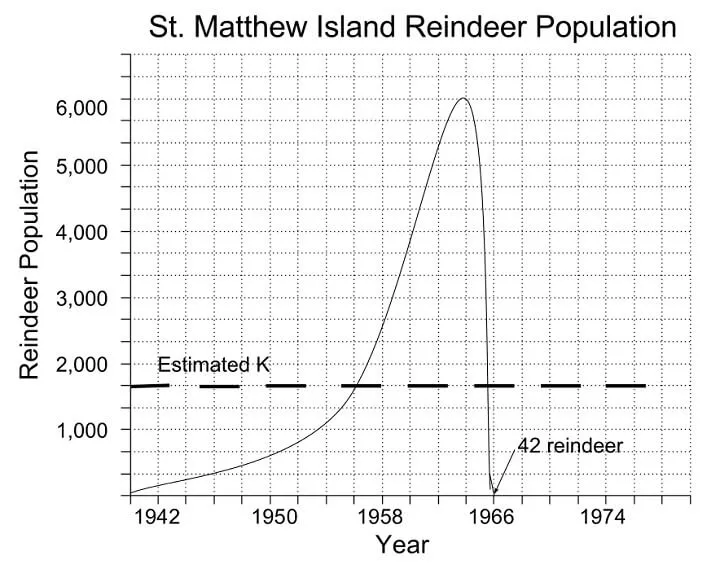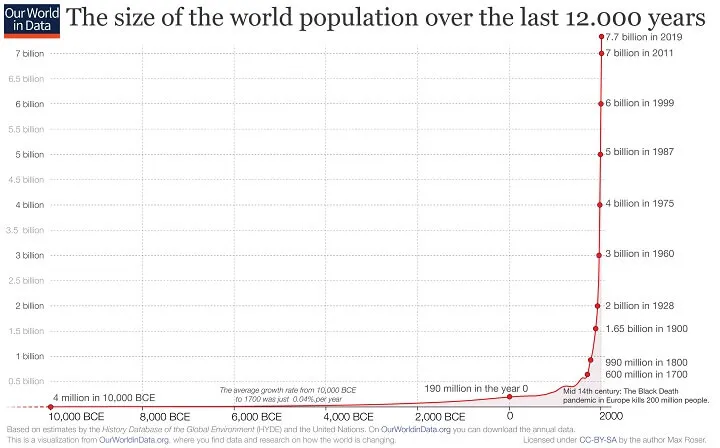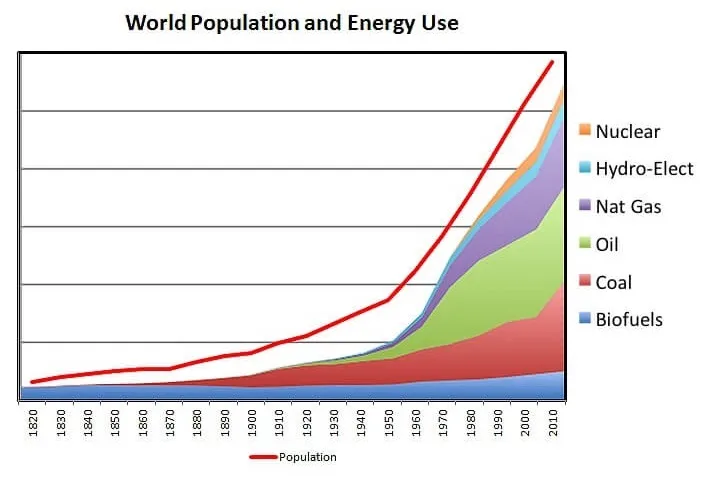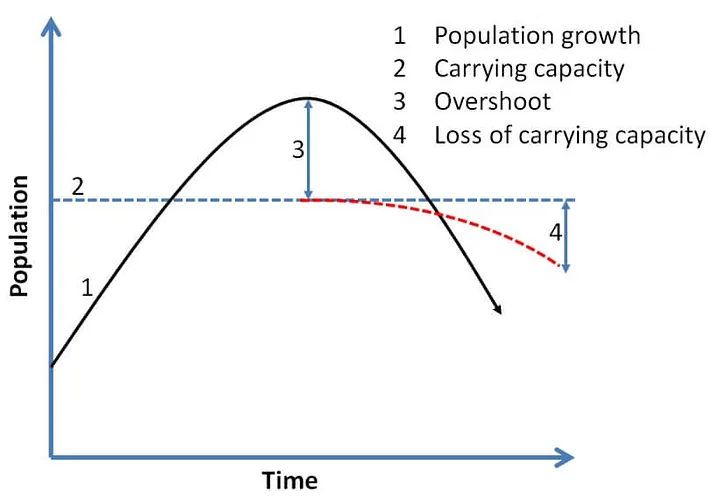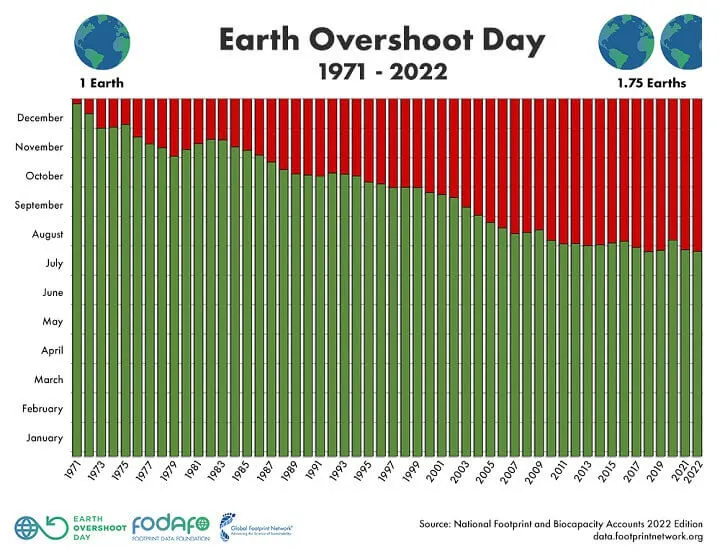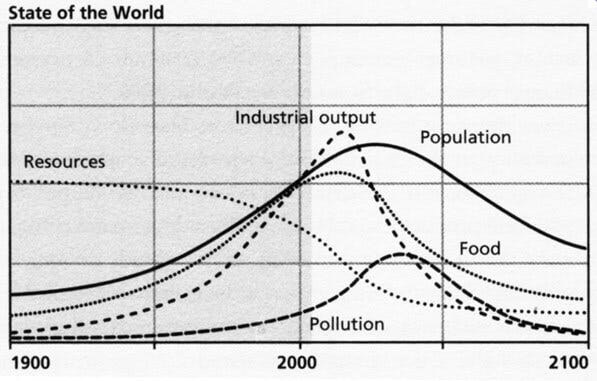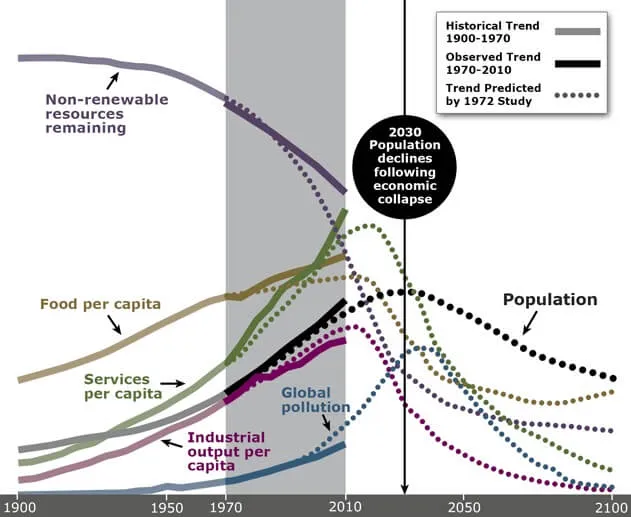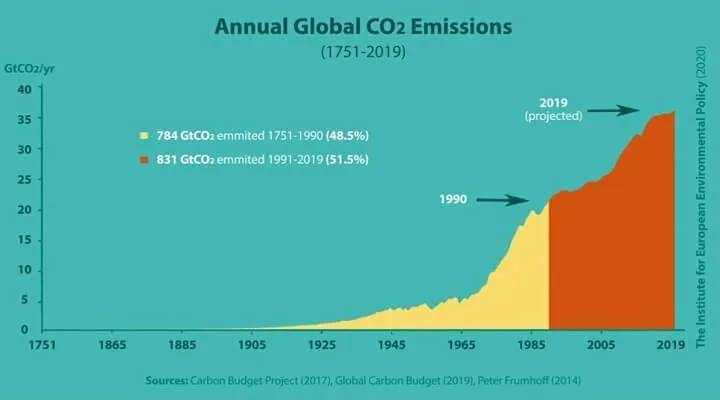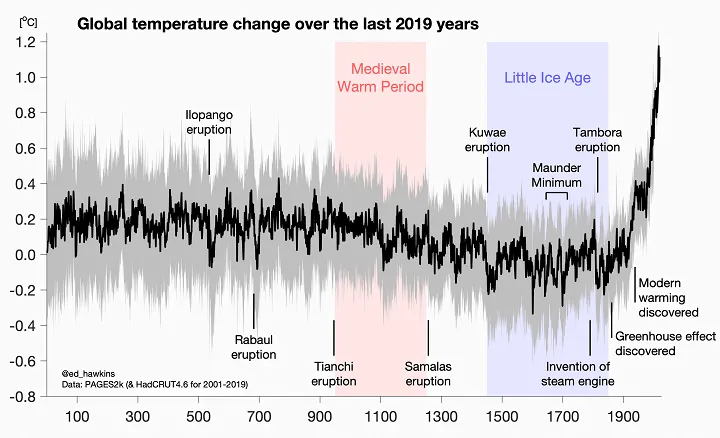came across this a while back- alan urban pretty much laid all of this out in a better more efficient way of explaining the current situation we're in.
the only part i disagree with, is probably in the last section(What now?) in terms of how Alan describes white people as being part of the "others'(a term or process used by fascists in an attempt to dehumanize anyone who isn't like them).
while i dont doubt white folks are just as susceptible to harm- white supremacy is still very much alive in our societies and its ramifications to anyone in the global south(or just different ethnicity from the "white" standard), in fact there's a pretty good chance that the eco-fascists folks tend to mischaracterize me or other malthusians as- will most likely be the white supremacists who acknowledge the environmental predicament we're in and use it as a stepping stone for eliminating/suppressing the "undesirables" of our population as described in the last section and being anti-immigrant as people try to leave their homes for better pastures.
if you're a white person-last thing you're going to be discriminated against is the difference in melanin(at least on a systematic scale, individually speaking is another story- but even then the "racism" expressed is usually built on a good foundation as a response to the injustice of white supremacy- its just taken too far however.) to those who ran out of member stories-here's the text:
I have some bad news. Civilization is going to collapse. Not in 1000 years, not in 100 years, but within the lifetimes of most people alive today.
It doesn’t necessarily mean humans will go extinct, but at the very least, billions of people are going to die from disease, violence, starvation, dehydration, natural disasters, and war.
How do I know this? Because it has already begun.
Our global industrial civilization has been headed for collapse for at least 50 years. That’s how long ago the human population went into overshoot, a concept that is crucial to understand if you’re going to make sense of the horrors that await us in the 21st century.
What is Overshoot?
Ecological overshoot happens when the demands of a species exceed the regenerative capacity of the ecosystem. As the species multiplies, it consumes the ecosystem faster and faster, and the population skyrockets. Once there is nothing left to eat, the population collapses.
This is the meta-problem of our time. When people talk about problems the world is facing, they usually focus on climate change or biodiversity loss or the threat of nuclear war, but all of these problems are merely symptoms of overshoot. And yet, most leaders and politicians have never even heard of it.
To help you understand, let’s take a look at a classic example of overshoot that occurred on an island off the coast of Alaska.
The St. Matthew Island Reindeer Herd
St. Matthew Island is 128 square miles of tundra in the middle of the Bering Sea, over 200 miles from the nearest Alaskan village. It is said to be the most remote place in Alaska.
Prior to World War II, it was unoccupied. Then in 1944, the Coast Guard installed a loran (long range aids to navigation) and put 19 men on the island to operate the station. In order to make sure the men had a backup food source, the Coast Guard released 29 reindeer onto the island.
For the reindeer, it was heaven. There were no predators, there was grass everywhere, and the tree trunks were covered with lichen, which is like candy to reindeer.
When World War II began drawing to a close, the men were pulled from the island and the reindeer were left behind. Over the next decade, they began breeding prolifically.
Thirteen years later in 1957, Dave Klein, a biologist working for the U.S. Fish and Wildlife Service, visited St. Matthew Island. He and his assistant counted about 1,350 reindeer, all of which appeared to be very well-fed. With mats of lichen several inches thick, the island had plenty of food for the population of reindeer to grow exponentially.
In 1963, Klein returned to the island with three other scientists. As soon as they arrived, they saw reindeer everywhere. Incredibly, they counted 6,000 reindeer. However, the deer did not appear to be as fat and healthy as before, and the land showed signs of overgrazing.
He returned again in 1966, and what he found was horrifying. The island was covered with deer skeletons, and there were only 42 living deer left, all of which were emaciated. This means the population had plummeted by 99% in just a few years.
So why did this happen? Most people are perplexed when they hear this story. Why didn’t the reindeer population grow to the island’s carrying capacity, then level off?
The answer is overshoot. Most people would assume that if there were 6,000 deer living on an island, then the carrying capacity must be somewhere above 6,000. In reality, the carrying capacity was probably more like 1,000 or 2,000. The deer population grew faster than the local flora could regenerate.
So why did the population of deer grow so quickly? Because of exponential growth. People have a tendency to think of growth as steady and linear, but life doesn’t grow that way. As long as there are no limiting factors like predators, diseases, or lack of food, a population of animals will keep doubling until something stops it.
In the case of St. Matthew Island, the deer population doubled every 2–3 years until 1960 or so, when growth began to slow down. Finally, once 99% of the food was gone, there was a mass die-off, leaving only 42 surviving reindeer. (There’s a great comic by Stuart McMillen that tells this story. You can read it here.)
And that is not the only time this has happened to a herd of reindeer. Similar incidents occurred on St. Paul Island near Alaska and on the Kaibab Plateau in Arizona.
Now take a look at the human population since the advent of agriculture, and ask yourself, “What is going to happen next?”
The Population Bomb
Prior to 10,000 BCE, humans were hunter-gatherers, and with that lifestyle, they had already reached the carrying capacity of the planet. Back then, temperatures varied wildly, going up and down by several degrees Celsius from one millennium to the next.
Then something amazing happened: Earth’s climate became incredibly stable, and for the next 12,000 years, all the way up until the 20th century, the average global temperature stayed within a range of less than 1 degree Celsius. This era is known as the Holocene.
Thanks to this stable new area, the weather became much more predictable. Instead of alternating periods of drought and flooding, farmers could now expect about the same amount of rainfall every year. This allowed farms to expand rapidly, drastically increasing the local carrying capacity for humans.
Slowly but surely, the human population began to grow (about 0.04% per year). However, there were still limiting factors that kept growth in check. Things like wars and diseases.
Regardless, the population kept growing, and by the 1700s, growth was beginning to go exponential. Humans came up with new inventions such as the water frame and the steam engine, which allowed them to produce more goods. By the 1800s, even more inventions came along such as electric generators and incandescent lamps.
The most important thing about these inventions is that they allowed people to harness more energy. More energy means more stuff and more food. As people’s standard of living improved, they were able to have more children, causing the population to grow even faster.
Until the late 1800s, the primary sources of energy were wood, coal, and whale oil. But with the discovery of oil fields all across America in the early 1900s, everything changed. Oil was much more adaptable and flexible, and it had twice the energy-density of coal. Plus, it was much easier to get it out of the ground.
With all this new energy, living standards and populations grew even faster. Suddenly, people were inventing automobiles, radios, airplanes, and televisions. It seemed as though there was enough energy to last forever.
However, there were some who warned that the age of abundance would not last forever. In 1968, Paul Ehrlich and his wife Anne Ehrlich, both biologists, wrote a book called The Population Bomb. It warned that before long, overpopulation would lead to worldwide famine. This seemed plausible as most of the world’s best farmland was already being used, and the population growth rate had skyrocketed to over 2% per year.
Early editions of the book began with the following statement:
“The battle to feed all of humanity is over. In the 1970s hundreds of millions of people will starve to death in spite of any crash programs embarked upon now. At this late date nothing can prevent a substantial increase in the world death rate.”
Of course, Ehrlich turned out to be wrong, and the population grew from only 3.5 billion back then to over 8 billion today.
So does that mean we can all relax and stop worrying about overpopulation? Hardly. Ehrlich was wrong because he didn’t anticipate the Green Revolution, which took off in the 1970s.
Farmers began to use new chemical fertilizers such as phosphorous and ammonia (which is derived from natural gas), and agrochemicals such as pesticides and herbicides (which are derived from oil). In addition, they began to use new types of farming equipment that mechanized cultivation and harvesting.
But that’s not all. In the past, a drought meant a much lower crop yield, but new technologies allowed farmers to pump water out of deep underground aquifers. Also, scientists developed new high-yield crop varieties that never existed in nature.
One of the key scientists was Norman Borlaug, who won the Nobel Peace Price in 1970 and is credited with saving over a billion people from starvation. Without the Green Revolution, the world population probably would have peaked somewhere around 4 billion.
Overshoot and Collapse
Thanks to all these new forms of energy and technology, humans have vastly increased the carrying capacity of the planet. However, this increased carrying capacity is an illusion. William R. Catton, author of Overshoot: The Ecological Basis of Revolutionary Change, called it “phantom carrying capacity.”
Our ability to feed 8 billion people is completely dependent on fossil fuels such as oil and natural gas. Once we begin to run out of them, they will become much more expensive, which means everything else-especially food-will become much more expensive as well.
Peak Oil
Peak oil is the point at which the production (or rather, extraction) of oil peaks then goes into decline. Because there is a finite amount of oil on this planet, peak oil is going to happen eventually. The only question is when. But now, there are signs that peak oil already happened a few years ago.
Of course, oil companies continue to discover new oil fields, but they’re not discovering them fast enough to keep up with demand. In fact, new oil discoveries are at their lowest level in 75 years. Even Saudi Aramco, the world’s largest oil producer, has warned that their spare capacity is “ extremely low.”
If we truly have reached peak oil, then we are in big trouble. As I explained earlier, population growth is directly tied to energy usage. Without plenty of affordable energy, we cannot continue to grow our population or even maintain it. Thus the term, “phantom carrying capacity.”
There are people who say we don’t have to worry about peak oil because we are switching to new technologies like solar panels, wind turbines, and electric vehicles. However, the switch isn’t happening fast enough, and we still use fossil fuels to manufacture so-called renewables (for example, the plastic in them is made from oil).
Besides, all this green energy requires another finite resource: rare-earth metals. The great thing about oil is that all of the energy is already stored inside of it. But for renewable energy, we need to store the energy in batteries so we can drive vehicles and power our homes even when the sun isn’t shining and the wind isn’t blowing. And for batteries, we need metals like lithium, cobalt, and nickel.
The problem is, new research suggests that there simply aren’t enough rare-earth metals in the ground for a green energy revolution. The fact that so few people anticipated this problem boggles the mind.
Even if there were enough metals for a green revolution, we still need natural gas to keep growing food on such a large scale. This is because of the Haber-Bosch process. This scientific breakthrough gave us the ability to derive ammonia from natural gas, and the ammonia is used to create fertilizer (part of the Green Revolution mentioned above).
About 50% of the world’s food production depends on fertilizer that is created this way. There is no substitute. This is why fertilizer prices (and thus, food prices) are getting higher and higher, because natural gas has gotten so expensive. What happens when we run out?
Humans have essentially painted themselves into a corner. We have to keep using fossil fuels to maintain the population, but if we do that, eventually we will run out of fossil fuels and the population will collapse. Sure, we could produce more renewables and try to use fewer fossil fuels, but that would only delay the inevitable.
There is no way out of this mess.
Degraded Carrying Capacity
As terrifying as this information is, the situation is even worse than you think.
When a species overshoots the carrying capacity of an ecosystem, the carrying capacity is degraded. To make this more clear, let’s take another look at the reindeer on St. Matthew Island.
The deer mostly ate grass in the spring and summer, then lichen in the fall and winter. During the winter, the grass roots would remain dormant until they started growing again in the spring.
At some point, there were too many deer and not enough grass. Once the deer ate all the grass and couldn’t find anymore lichen, they dug up the grass roots and ate those as well. This got them through the winter, but it meant that less grass grew in the spring.
This is a classic example of overshoot and degraded carrying capacity. The deer overgrazed to the point where the island could support less deer than it could before they went into overshoot. Here’s a graphic that shows what I mean:
In the same way that reindeer degraded the carrying capacity of St. Matthew Island, humans have degraded the carrying capacity of the planet Earth. The signs are everywhere.
Topsoil is eroding faster than it can regenerate. Since farmers began tilling soil in the Midwest in the 19th century, over 50 billion tons of topsoil has eroded.
According to the USDA, the erosion rate is double what is believed to be sustainable. Some experts believe all the topsoil will be gone in less than 60 years, after which it will be nearly impossible to grow food.
Aquifers are emptying faster than they can refill. This is very worrying since aquifers provide one-third of the planet’s drinking water and nearly half of the planet’s irrigated agriculture.
For example, the Ogallala aquifer, which stretches from South Dakota down to Texas, could be almost gone in just 20 years. After that, Midwestern farmers will be out of business. Countries around the world are facing the same problem with their own aquifers.
Forests are being cut down faster than they can regrow. Forests aren’t just for creating furniture, construction materials, and other wood products. They’re also used for energy.
In the European Union, burning trees for energy is considered renewable since trees can regrow. The problem is, they’re burning them faster than they can grow back. This is terrible for the environment as forests are needed to purify the air and water. We are literally burning down our life support system.
Fisheries are being plundered faster than they can restock. This is very bad news for the 3 billion people who rely on fish as a significant source of protein in their diets, not to mention 10% of the world population who rely on fishing for income.
So if you thought that we could make up of for the loss of good farmland and aquifers with seafood, think again. It is very possible that the oceans could be virtually empty of fish by 2048.
And of course, fossil fuels are being extracted far faster than they can replenish. It takes millions of years for sunlight to be stored in the form of fossil fuels, so for human purposes, fossil fuels are a one-time deal. Once they’re gone, that’s it. And it looks like we’ve already extracted all the “low hanging fruit.”
All this technology allowed humans to vastly increase the carrying capacity of the planet, but it is a temporary increase. Technology merely delays collapse, which ensures that once collapse arrives, it will happen much more quickly.
Earth Overshoot Day
At this point, there are two big questions we need to answer. The first one is: Have we overshot the carrying capacity of the Earth yet?
We can get a clue to the answer by looking at research done by the Global Footprint Network. Every year, they calculate the date when humans have used all the natural resources that the planet can generate that year. It’s called Earth Overshoot Day, and this year it was on July 28.
This means that for our civilization to continue functioning after July 28, it it has to draw down resources that had accumulated long before humans came along. Resources like the ones mentioned above: topsoil, aquifers, forests, fisheries, and fossil fuels. Eventually, they will all be gone.
So clearly we are already in overshoot, but how long have we been in overshoot? Take a look:
As you can see, we have been in overshoot since 1971. Over 50 years ago. Back then, the global population was about 3.7 billion, which suggests that the actual carrying capacity of the planet is somewhere below 3.7 billion.
Of course, this depends on people’s lifestyles. If everyone on Earth lived like people in Bangladesh, there wouldn’t be an Earth Overshoot Day. But if everyone on Earth lived like people in the United States, then Earth Overshoot Day would be on March 13. However, for the purposes of this article, we’ll just look at the world population as a whole.
Limits to Growth
Overshoot and collapse go hand in hand. If we’ve overshot the carrying capacity of our planet, then collapse is inevitable.
So now there’s a second question we need to answer: How much longer until the human population collapses?
To answer this, let’s take a look at research conducted by MIT and published by the Club of Rome back in 1972. They wanted to find out how much longer industrial civilization could last before running out of essential resources. To figure this out, they looked at five factors:
Once they had this data, they developed the World3 model, a system dynamics model that uses computers to simulate interactions between these five factors in order to determine how they affect each other.
They ran several different scenarios. For example, what if we start living more sustainably? What if we find new ways to increase the planet’s carrying capacity? And what if we don’t do anything and just continue business as usual?
According the business-as-usual scenario (BAU2), economic growth would peak in the 2030s, and civilization would begin to collapse around 2040. Here’s what it looks like:
The researchers compiled everything they learned and published it in a book called Limits to Growth. It quickly became a bestseller, but it was also very controversial.
Politicians, economists, and business leaders bristled at the idea that economic growth could have limits, which makes sense because their jobs are to ensure fast and limitless growth in order to keep voters and investors happy. As Upton Sinclair said, “It is difficult to get a man to understand something, when his salary depends on his not understanding it.”
Since this research was done 50 years ago, we can now look at data from the past five decades and see how accurate the researchers actually were. And that’s exactly what Gaya Herrington, a student at Harvard University, decided to do.
She said, “Given the unappealing prospect of collapse, I was curious to see which scenarios were aligning most closely with empirical data today. After all, the book that featured this world model was a bestseller in the 70s, and by now we’d have several decades of empirical data which would make a comparison meaningful. But to my surprise I could not find recent attempts for this. So I decided to do it myself.”
For her Masters thesis, she looked at ten factors:
1.Population
2.Fertility Rates
3.Mortality Rates
4.Industrial Output
5.Food Production
6.Services
7.Non-renewable Resources
8.Persistent Pollution
9.Human Welfare
10.Ecological Footprint
What she found was terrifying. It seems that humans have been following the business-as-usual scenario more closely than any other scenario.
Of course, no study is perfect. The population could begin to go down before 2030, or it might not go down until many years after 2030. But no matter what, it seems certain that it will go down within the next few decades.
Unless you are hundreds of years old, you have never lived during a time when the global population went down. Even during terrible times like the Spanish flu or World War II, the population continued to grow. Once it starts going down, it will likely be due to a famine unlike any we’ve ever seen.
Climate Change
Earlier I said that our ability to feed 8 billion people is completely dependent on fossil fuels. However, there is something else we also need: stable weather patterns. But thanks to climate change, stable weather patterns are going away, too.
Many people see climate change as the biggest challenge of our time, but the truth is that climate change is merely a symptom of overshoot. It’s essentially a waste-management problem. Humans have been burning wood and coal for thousands of years, but the trees and oceans were always able to absorb the excess carbon dioxide.
Now, we are emitting carbon dioxide and other greenhouse gases so quickly that there is no way the planet can absorb it all. The oceans have absorbed most of it, but that has caused them to become more acidic, leading to the destruction of coral reefs. Forests used to absorb a lot of it, but they are being cut down so quickly that they now act as a carbon source instead of a carbon sink.
Despite nearly 30 years of COP summits and pledges by nations to slash emissions, things are worse than ever. In fact, in the 34 years since scientists first testified to Congress about the dangers of global warming (paywalled,will find another link for this one), we have emitted more greenhouse gasses than in all of history before that.
As a result of all these greenhouses gases floating around, more and more heat from the sun will be trapped in the atmosphere, and temperatures will rise-not just linearly, but exponentially.
The world has already warmed by about 1.2°C since the late 1800s (before the oil boom), but half of that warming has happened in the last 30 years. That means the average global temperature increase doubled in the last 30 years, and it looks as though it will double again in the next 30 years. Classic exponential growth.
Many people say that climate change is a natural process, and they’re right. As I mentioned above, climate change has been occurring ever since the Earth formed. However, except for times when the Earth was struck by asteroids, it has never changed anywhere near this quickly.
The last 7 years were also the 7 warmest years in recorded history. Just look at how fast temperatures are rising:
This is not normal. Humans have impacted the environment so severely that according to many scientists, the Holocene epoch is over and we are entering a new epoch know as the Anthropocene.
What can we expect in the Anthropocene? Well, given that we are already seeing record-breaking droughts,floods, heat waves, and biodiversity loss at 1.2°C of warming, we can only imagine how bad things will be when the temperature increase doubles again over the next 30 years.
Accelerating Collapse
Even if there were no such thing as climate change, we would still be headed for collapse in the next few decades. But unfortunately, climate change is very real, and it will only accelerate the collapse.
A great example is what has happened to the aquifers mentioned above. We are rapidly using up all of our groundwater, but we wouldn’t have to if it weren’t for drought. Currently, countries all over the world are experiencing some of their worst droughts in centuries, something climate scientists have been predicting for decades.
Thanks to drought, crop yields all around the world are beginning to decline. Floods are also causing problems for farmers. Recently, half of Pakistan’s breadbasket was wiped out by the worst flood in over 70 years. We can expect similar disasters in other breadbaskets around the world.
Another great example is what’s happening to ocean life. Recently, snow crab season was cancelled for the first time in history due to the disappearance of billions of snow crabs.
The most likely explanation is warming oceans. Snow crabs hatch in extremely cold water, but since the Bering sea has been warmer than usual lately, it is possible that the warmer waters made the snow crabs more susceptible to diseases and predators. We were already overfishing in the Bering sea, and now climate change has made the problem even worse.
Extreme weather doesn’t just affect crop yields and fisheries, it also affects supply chains. Possibly the most important part of the United States supply chain is the Mississippi river, and right now it is at a record low.
As a result, the water is too low for most barges to traverse, and at least 2000 of them are backed up. As Mike Ellis, CEO of American Commercial Barge Line, said, “America is going to shut down if we shut down.”
All this is happening while the global population continues to grow. This is unsustainable, to put it mildly. Climate change not only accelerates collapse, it magnifies the consequences of collapse.
How Did We Get Here?
Most people refuse to believe that our civilization is unsustainable and headed for collapse in the near future. There are people who have been presented with all the facts mentioned in this article who still refuse to accept the truth.
But why? There are many possibilities, but I think a big one is cultural conditioning. Ever since we were born, we were all taught by the media that technology is a good thing. They say technology is progress, and the more technology we have, the freer and happier society will be. Like in Star Trek.
So when you tell people that actually, technology is destroying the planet and leading us toward collapse, they find it impossible to believe. They’ll even say that what we need now is more technology. But unfortunately, we can’t solve our problems with the same methods that got us into this predicament.
There are countless peer-reviewed studies demonstrating that we are in overshoot right nowand that we are headed for a hunter-gatherer future. These studies are based on empirical data and basic math, yet many environmentalists refuse to believe it. They say growth is fine, we just need to switch to “green growth.”
But it’s not just cultural conditioning that does this to people; it’s also fear. When I first realized that society will probably collapse in my lifetime, I tried really hard to convince myself that it wasn’t true. I started learning about techno fixes, green energy, and sustainable growth. It took me a long time before I finally realized that sustainable growth is an oxymoron.
Ever since the Limits to Growth study back in 1972, it has been clear that our global civilization would collapse someday, but few people believed it. Only now that resource depletion and climate disasters are becoming such obvious problems are people finally starting to wake up.
What now?
As more and more people wake up to the reality of collapse, it is absolutely crucial that we help them understand why collapse is happening.
The entire history of humans throughout the Holocene is characterized by overshoot and collapse. When societies exceeded the carrying capacities of their ecosystems, they usually either went to war with neighboring societies or devolved into civil war.
My fear is that when the economy collapses and things start to get really bad, people will blame others. The others could be anybody: Jews, immigrants, white people, minorities, fascists, socialists, the patriarchy, the “woke mob”, or other nations such as Russia or China.
We must understand that collapse is not the fault of some malignant “other.” Collapse is the inevitable result of overshoot, and overshoot is everybody’s fault. Yes, some people are more to blame than others, but unless you’ve lived your entire life off-the-grid and self-sufficient, you too have contributed to overshoot.
We need to stop blaming each other and start working together. We need to create a culture based on sustainability instead of consumption, a culture where we care more about leaving things to our children than acquiring things for ourselves. We need to eliminate the idea that humans are separate from nature and remember that we are all part of nature.
Until we do these things, I fear that we will only make our predicament worse. I’ll close with a quote from William Catton, author of Overshoot: The Ecological Basis of Revolutionary Change:
“I have tried to show the real nature of humanity’s predicament, not because understanding its nature will enable us to escape it, but because if we do not understand it, we shall continue to act and react in ways that make it worse.”
